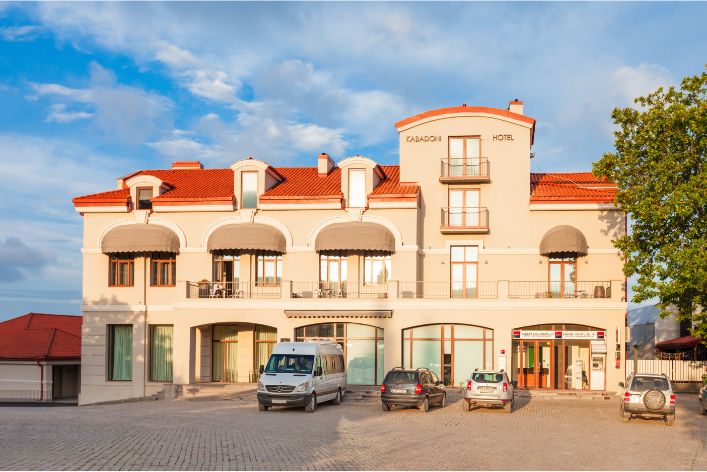Last Updated on May 18, 2023
Real estate trends are constantly evolving, and one of the most notable shifts in recent years has been the boom in boutique hotels. As the hospitality industry becomes more competitive, travelers are seeking unique experiences that cater to their individual needs and preferences. This has led to a surge in demand for boutique hotels, which offer personalized service, one-of-a-kind design, and a sense of authenticity that is often lacking in traditional hotels.

This trend has not gone unnoticed by real estate investors, who are increasingly looking to boutique hotels as a lucrative investment opportunity. Boutique hotels offer higher returns and lower operating costs compared to traditional hotels, making them an attractive option for investors.
In this blog post, we will explore the reasons behind the growing popularity of boutique hotels in the real estate industry. We will look at the unique characteristics that differentiate boutique hotels from traditional hotels, and the advantages they offer for both guests and investors. We will also examine successful case studies and analyze the factors that have contributed to their success.
While the boutique hotel market presents exciting opportunities for investors, there are also challenges and risks associated with this type of investment. We will explore these challenges and provide insights into how investors can mitigate the risks and capitalize on the opportunities presented by the booming boutique hotel market.
Overall, this blog post aims to provide a comprehensive overview of the boutique hotel market and its potential for growth in the real estate industry. Whether you are a traveler seeking a unique experience or an investor looking to capitalize on the latest real estate trends, this post will provide valuable insights and information.
Read: Repurposing Commercial Real Estate as Hotels
Definition and Characteristics of Boutique Hotels
Boutique hotels distinguish themselves from other accommodations through their unique characteristics, design, and personalized service. Unlike traditional hotels, which often follow a standardized model, boutique hotels offer a more intimate and customized experience for guests. Here are some of the key characteristics that differentiate boutique hotels from traditional hotels:
- Size: Boutique hotels are typically smaller in size, with fewer rooms and a more intimate atmosphere. This allows for a more personalized level of service, as staff can focus on individual guests and their needs.
- Design: Boutique hotels often feature unique and innovative designs, with an emphasis on art, culture, and local influences. This creates a distinct and memorable experience for guests, who appreciate the attention to detail and individuality.
- Personalized Service: Boutique hotels pride themselves on offering personalized service, with staff trained to anticipate guests’ needs and preferences. This creates a more personalized and authentic experience for guests, who feel valued and appreciated.
- Location: Boutique hotels are often located in trendy or off-the-beaten-path areas, rather than the commercial or touristy areas where traditional hotels are typically found. This allows guests to experience the local culture and surroundings in a more authentic way.
Advantages of boutique hotels for both guests and investors:
- Personalized Experience: Boutique hotels offer a more personalized and authentic experience for guests, which is highly valued in today’s travel market. Guests appreciate the attention to detail and individuality and often return for future stays.
- Higher Room Rates: Due to the unique and personalized nature of boutique hotels, they can command higher room rates than traditional hotels. This allows for higher returns on investment for investors.
- Lower Operating Costs: Boutique hotels are often smaller in size and require less staff and maintenance than traditional hotels, resulting in lower operating costs and higher profit margins.
- Unique Investment Opportunity: Investing in a boutique hotel offers a unique opportunity for investors to enter the hospitality market and differentiate themselves from traditional hotel investments. With the growing demand for boutique hotels, there is potential for high returns on investment.
In a nutshell, boutique hotels offer a unique and personalized experience for guests and a lucrative investment opportunity for real estate investors. By understanding the defining characteristics and advantages of boutique hotels, investors can capitalize on the growing demand for this type of accommodation and reap the rewards of a successful investment.
Read: Investing in Beachfront Hotels: What to Know
Factors Driving the Growth of Boutique Hotels in Real Estate
The growth of boutique hotels in the real estate industry can be attributed to several factors, including changes in consumer preferences, the unique selling points of boutique hotels, and the advantages they offer to investors.
1. Changes in Consumer Preferences
Travelers are increasingly seeking unique and personalized experiences when choosing their accommodations. Boutique hotels offer a more authentic and personalized experience, which is highly valued by travelers. This shift in consumer preferences has led to a surge in demand for boutique hotels.
2. Unique Selling Points
Boutique hotels differentiate themselves from traditional hotels by offering unique designs, personalized experiences, and a sense of authenticity. These features create a distinct and memorable experience for guests, which leads to repeat business and positive word-of-mouth marketing.
3. Design
Boutique hotels often feature innovative and unique designs, with an emphasis on art, culture, and local influences. This creates a visually stunning and immersive environment for guests, which is highly appealing.
4. Personalized Experiences
Boutique hotels pride themselves on offering personalized service, with staff trained to anticipate guests’ needs and preferences. This creates a more personalized and authentic experience for guests, who feel valued and appreciated.
5. Authenticity
Boutique hotels often reflect the local culture and surroundings, creating a sense of authenticity that is highly valued by guests. This creates a unique and memorable experience that stands out from traditional hotels.
6. Advantages for Investors
Boutique hotels offer higher returns on investment and lower operating costs compared to traditional hotels. The unique and personalized nature of boutique hotels allows them to command higher room rates, resulting in higher returns for investors. Additionally, boutique hotels are often smaller in size and require less staff and maintenance, resulting in lower operating costs and higher profit margins.
In a nutshell, a combination of changes in consumer preferences and the unique selling points of boutique hotels, as well as the advantages they offer to investors, have attributed to the growth of boutique hotels in the real estate industry. By understanding these factors, investors can capitalize on the growing demand for boutique hotels and reap the rewards of a successful investment.
Read: 10 Top Real Estate Investments in Luxury Hotels

Case Studies: Examples of Successful Boutique Hotel Investments
To truly understand the success of boutique hotels in the real estate industry, it’s important to examine successful case studies. Two examples of highly successful boutique hotels are The Hoxton Hotel and Ace Hotel.
- The Hoxton Hotel: The Hoxton Hotel is a chain of boutique hotels with locations in London, Amsterdam, Paris, and New York. The Hoxton has a unique design, with a mix of vintage and contemporary elements, and offers personalized service to guests.
- Ace Hotel: The Ace Hotel chain has locations in cities across the United States, as well as in London and Kyoto. Ace Hotels are known for their unique design, which often incorporates local art and culture, as well as their commitment to sustainability and community involvement.
Success Factors:
- Design: Both The Hoxton and Ace Hotel chains have a unique and innovative design that sets them apart from traditional hotels. This creates a visually stunning and memorable experience for guests, which leads to repeat business and positive word-of-mouth marketing.
- Personalized Service: The Hoxton and Ace Hotels both pride themselves on offering personalized service to guests, with staff trained to anticipate their needs and preferences. This creates a more personalized and authentic experience for guests, which is highly valued.
- Local Culture: Both The Hoxton and Ace Hotel chains reflect the local culture and surroundings, creating a sense of authenticity that is highly valued by guests. This creates a unique and memorable experience that stands out from traditional hotels.
Lessons Learned:
- Unique Design: To be successful in the boutique hotel market, it’s important to have a unique and innovative design that sets your hotel apart from the competition.
- Personalized Service: Offering personalized service to guests is essential in the boutique hotel market, as it creates a more authentic and memorable experience.
- Reflection of Local Culture: Reflecting the local culture and surroundings in your hotel design and service offerings is a key factor in the success of boutique hotels.
Investors looking to enter the boutique hotel market should also consider the potential risks and challenges associated with this type of investment. These include market saturation, seasonality, and changing consumer preferences. However, with careful planning and a focus on creating a unique and memorable guest experience, the boutique hotel market can offer lucrative returns for real estate investors.
All in all, The Hoxton and Ace Hotels are two examples of highly successful boutique hotels that have capitalized on the growing demand for unique and personalized accommodations. By understanding the success factors behind these hotels, as well as the potential risks and challenges of investing in boutique hotels, investors can make informed decisions and capitalize on the booming boutique hotel market.
Read: How to Negotiate a Real Estate Deal Like a Pro
Challenges and Risks of Investing in Boutique Hotels
While the boutique hotel market offers exciting opportunities for real estate investors, it also presents unique challenges and risks that must be carefully considered.
Challenges of Developing and Operating Boutique Hotels:
- Design: Boutique hotels require a unique and innovative design that reflects the local culture and surroundings. This can be challenging and expensive to develop, requiring a significant investment of time and resources.
- Personalized Service: Boutique hotels pride themselves on offering personalized service to guests, which requires a highly trained and attentive staff. This can be difficult to achieve and maintain, and can add to the operating costs of the hotel.
- Operational Efficiency: Boutique hotels are often smaller in size and require fewer staff and resources than traditional hotels. This requires a focus on operational efficiency, which can be challenging to achieve without sacrificing the personalized service that guests expect.
Risks Associated with Investing in Boutique Hotels:
- Market Saturation: The boutique hotel market is becoming increasingly crowded, which can lead to market saturation and intense competition. This can make it difficult for new boutique hotels to stand out and attract guests.
- Seasonality: The demand for boutique hotels can be highly seasonal, with peak periods of demand followed by slower periods. This can make it difficult to maintain consistent occupancy rates and revenue throughout the year.
- Changing Consumer Preferences: The preferences and tastes of consumers are constantly evolving, which can make it difficult for boutique hotels to keep up with changing trends and demands.
In order to mitigate these challenges and risks, investors must carefully plan and execute their boutique hotel investment strategy. This includes a focus on creating a unique and innovative design, offering personalized service to guests, and achieving operational efficiency. Additionally, investors must carefully analyze market trends and consumer preferences to ensure that their boutique hotel is well-positioned to succeed in a crowded and competitive market.
Lastly, investing in boutique hotels offers a unique and potentially lucrative opportunity for real estate investors. However, it’s important to carefully consider the challenges and risks associated with this type of investment, and to develop a comprehensive strategy for success. By doing so, investors can capitalize on the growing demand for unique and personalized accommodations and reap the rewards of a successful investment.
Read: The Ultimate Guide to Renting a Luxury Apartment
Conclusion
Several factors have contributed to the booming popularity of boutique hotels in the real estate industry, including changes in consumer preferences, unique design, and personalized service, as well as the advantages they offer investors, such as higher returns and lower operating costs. Successful case studies such as The Hoxton Hotel and Ace Hotel provide valuable insights into the success factors of boutique hotels, including unique design, personalized service, and reflection of local culture.
Investors looking to enter the boutique hotel market should be aware of the challenges and risks associated with this type of investment, including market saturation, seasonality, and changing consumer preferences. However, with careful planning and execution, boutique hotels offer a unique and potentially lucrative investment opportunity for real estate investors.
The future of the boutique hotel market looks bright, with growing demand for unique and personalized accommodations among travelers. As long as boutique hotels continue to innovate and provide exceptional guest experiences, there is potential for continued growth in this market.
On a final note, the growing popularity of boutique hotels in the real estate industry can be attributed to their unique characteristics, personalized service, and advantages for investors. By understanding the success factors and potential challenges of investing in boutique hotels, investors can capitalize on this booming market and reap the rewards of a successful investment.
Read: How to Choose the Right Neighborhood for Your Next Home
Before You Go…
Hey, thank you for reading this blog to the end. I hope it was helpful. Let me tell you a little bit about Nicholas Idoko Technologies. We help businesses and companies build an online presence by developing web, mobile, desktop, and blockchain applications.
We also help aspiring software developers and programmers learn the skills they need to have a successful career. Take your first step to becoming a programming boss by joining our Learn To Code academy today!
Be sure to contact us if you need more information or have any questions! We are readily available.








